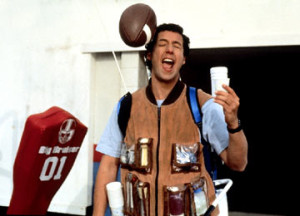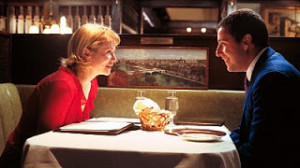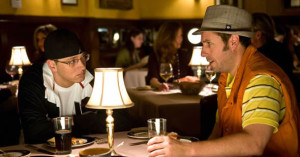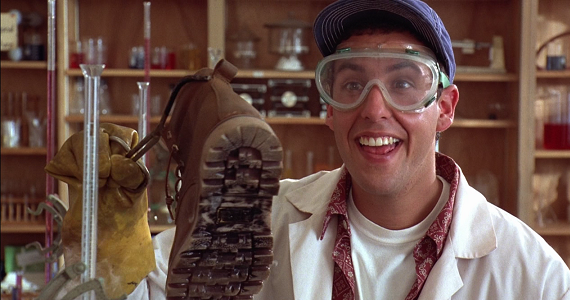Welcome back to “I’m All Out Of Love”, in which I take a pop culture subject (film series, director, actor, television show, etc) and dissect how my ‘love’ of them from early on slowly dwindled and what my current stance on them is.
Saturday Night Live breeds and fosters many talents. In its near 40 year history, the NBC variety show has helped start the careers of many a comedic talent, no matter how short lived or spotty that career would end up being by the time they left 30 Rockerfeller Plaza. One of the more successful of those alumni is Adam Sandler, graduating from the same early 90s era that brought the likes of Norm Macdonald, Mike Myers and Chris Rock. Sandler’s days of sketch comedy eventually resulted in a film career that elevated him to superstardom, with a series of cartoonish yet surprisingly mainstream comedies that have entertained millions for nearly 20 years. He’s even managed to make the breakthrough into more dramatic works, working with the likes of Paul Thomas Anderson and James L. Brooks.
Yet, while Adam Sandler’s works have been big box office successes more times than not, not all have been the most accepted critically. Especially as of late, Sandler’s comedies have been panned as mindless drivel, crowded with bodily function jokes, sexist imagery and a slew of cameos from the more unsuccessful of SNL‘s alumni. And those who say such things are pretty spot on. Why, look no further than OneOfUs’ own Grown Ups 2 commentary (hooray for shameless synergistic website plug!) for a feature-length exploration of what Adam Sandler’s career has become. But if you want a lengthier analysis of one man’s personal journey with Sandler’s efforts, look no further than this article.
The Spark

I was far too young to enjoy Mr. Sandler’s initial rise to fame on SNL when it originally aired, so my first exposure to America’s 90s man child came from the first decade or so of his film career. As a child, Sandler’s antics were entertaining, melding together the more absurdist aspects of cartoons with the guilty charms of what a young boy would perceive as hysterically raunchy, like jokes about bodily functions. But upon reflection, there was also a heart that kept me watching. Sandler’s initial protagonists were the socially inept underdogs that people could sympathize with and root for throughout the film. Sure, he may have been playing a man child that was prone to violent outbursts, but he always stood up for the losers and fought against the uptight assholes who tried to persecute him for being different. It wasn’t the most grey or contemplative examination of morality, but those films served as enjoyable escapism and that’s what drove the young me to them.
In terms of specific films, the biggest ones of this era to highlight are Billy Madison, Happy Gilmore and The Waterboy. This initial trilogy of 90s comedies firmly established the tenants that many Sandler comedies would follow: an innocent child-like protagonist with little to no social skills and/or a speech impediment, a scenario where he must help save something precious to him (his father’s company, his childhood home, his first real friends on the lamest college football team in the state) from being beaten, taken over or demolished by an unapologetic prick of a villain, a love interest who’s inexplicably attracted to Sandler’s crass charms and a cast of fellow weirdo friends who were typically played by Sandler’s then up-and-coming SNL buddies… and Steve Buscemi. This formula continued well into the mid-2000s and the young me just couldn’t get enough of it, whether it be in the form of Big Daddy, The Wedding Singer or even Little Nicky. And while most of them haven’t remained that beloved to me upon re-watching (especially Little Nicky), I could at least still find some nuggets of charm in them, which is more than I can say for some of his more recent efforts. But we’ll get to that…
The Love Affair

As I grew older, I gained more exposure to Adam Sandler’s work outside of film, including his SNL stuff, his comedy albums, and his early stand up performances. Each showcased something essential about Sandler’s comedic style: his commitment. No matter how thin or one dimensional the joke was, Sandler always committed to it. That may not be something to usually praise the man for, but it’s that kind of dedication that helped make Sandler’s occasional stretches into more dramatic fair all the more believable and engrossing. In his review for Punch Drunk Love, the late Roger Ebert stated that “Sandler, liberated from the constraints of formula, reveals unexpected depths as an actor. Watching this film, you can imagine him in Dennis Hopper roles. He has darkness, obsession and power.” I really couldn’t have said it better myself… but I’m going to try to.
Punch Drunk Love is my favorite Adam Sandler film. It’s also my favorite Paul Thomas Anderson film. And I discovered it completely by accident on television. Initially expecting another Sandler rom-com vehicle, I was shocked by how enthralled I was by it. He wasn’t just playing a buffoon who tries to do good. He was playing a grounded three dimensional character, one who had some of the recognizable quirks of a typical Sandler protagonist, but with an intensity that showed the quirks came from a very deep seeded case of loneliness. Paul Thomas Anderson once described Punch Drunk Love as an “arthouse Adam Sandler film,” and that’s astonishingly accurate. The film takes the conventional constraints of the films that made Sandler famous and deconstructs them, from the outcast loner protagonist archetype to the violent outbursts. Yet, Anderson adds these shades of depth and emotional honesty that give this romantic comedy something more. Ideas of loneliness, regret and isolation that give the relationship between Sandler and Emily Watson something oddly beautiful. Unlike Adam Sandler’s other more serious productions, this is the one that really was made to showcase his capabilities as a performer and will forever be, for me at least, the shining example of his career.
Nothing Lasts Forever

Adam Sandler’s best decision as a Hollywood mogul and worst decision as an artistic talent was founding of his production company Happy Madison. The worst of Sandler’s tendencies as a comedic star started to come to light around the time Happy Madison Productions’ output became quite successful. The first one where it really hit me was Click. In many ways a terribly awful Adam Sandler comedy, the film tacks on this half-assed message about family and what it means to nearly lose it during the ending. The whole movie is spent showing you how awful Sandler is as a person, but we support him because he makes a last minute change of heart that doesn’t feel earned. This would prove to continue further as time went on. Films like I Now Pronounce You Chuck and Larry, Bedtime Stories, and Jack and Jill rang in a new era for Adam Sandler: his true “I don’t give a shit” phase of filmmaking. Even with the worst of his pre-mid 2000s work (*cough*Eight Crazy Nights*cough*) there still seemed to have some sort of effort put into them, even if it wasn’t directly from Sandler.
Once this new era started, noticeable changes to the typical Sandler formula started taking place; Sandler himself is now the ultra-successful higher functioning schlub, his far weirder and more pathetic friends (played by Sandler’s now failed SNL buddies, far worse comedic presences like Kevin James, Nick Swardson or Shaq, a random sports figure or the occasional still talented person who is struggling to find work… and Steve Buscemi), a wife who’s even more out of Sandler’s league than any of the ones in his earlier films (which includes the likes of Salma Hayek, Kate Beckinsale, Jessica Biel, Keri Russell and Katie Holmes), copious amounts of lazily displayed product placement and a location of some sort to shoot at that also doubles as a vacation spot. The “let’s save this thing I love” plot isn’t even a factor anymore. Hell, any sort of semblance of a real plot isn’t even a factor anymore, especially with the two Grown Ups films. It feels like Adam Sandler just slumped into creative bankruptcy, largely aiming to entertain his less successful friends with a vacation for each production rather than actually shoot a film. All of this really came to a head for me with Grown Ups 2, which may be a new low in terms of how transparent the laziness of Happy Madison really is at this point.
The problem with these Happy Madison Productions isn’t that they have immature humor or that they stretch the laws of reality. It’s that the lovable loser type character that had made Adam Sandler famous was gone, instead being replaced by this judgmental douchebag who made fun of others for being different, but still wanted to be perceived as another one of the lovable losers. Or, even worse, sometimes he was replaced by one of Sandler’s co-horts getting their own movie. *shivers* Basically, Adam Sandler had become the villain he spent the latter half of the 90s trying to fight against. The cartoon anarchist we knew and loved had become a part of the system he raged against, now using his crass humor and pension for friendship to scam good people out of money with the same exact garbage every time.
Final Thoughts

Adam Sandler as an artist is largely a hack. I don’t have any ill will towards Sandler himself when I say that. Based on what I’ve heard from him or seen of him in interviews, he seems like a very chill, laid back individual that treats his friends right and respects others. As an artist, however, he’s brought very little of worth to the table in the last decade or so of his career. The few things that I felt were of value (Spanglish, Reign Over Me, Funny People, Hotel Transylvania and, yes, even the Happy Madison Production You Don’t Mess With the Zohan) have usually been projects crafted by other filmmakers who might not have completely succeeded at their goal, but were at least striving to make an honest effort. The three comedies listed above should especially be noted, as they involved Adam Sandler collaborating with former writer buddies like Judd Apatow & Robert Smigel, who seemed to bring out the Adam Sandler we missed for so long. It seems that Sandler, true to his professionalism, actually puts his all into the visions of those who he surrounds himself with. But when those people are Happy Madison’s common dirge of uncreative directors like Dennis Dugan or Frank Coraci, it seems like they bring out the worst in Sandler.
There was a certain point where I thought Adam Sandler was just plain dumb, that he really did find the films he was making funny. Then I saw how willing he was to be self aware in Funny People and it hit me: he wasn’t dumb… he just didn’t care. It became clear that Sandler was fully aware of how awful 90% of his current career put out was and the fact that he went right back to doing the exact same type of failed comedies after decrying the entirety of them with fake posters and movie clips in Funny People instead of changing his style really did hurt my image of him substantially. Until Adam Sandler somehow changes up his style, I’ll still largely see him as a hack.
That all being said, the next time the man decides to stretch himself as an actor, I’ll gladly go see it. In fact, it looks like Sandler will be returning to his more respectable style of work, with two of his upcoming films being Jason Reitman’s Men, Women and Children and Thomas McCarthy’s The Cobbler. I honestly hope those films are successful enough for Adam Sandler to finally get out of his groove and have the sort of career renaissance he should have had post-Punch Drunk Love. Until then, I’ll have to deal with the next Happy Madison Production he’s starring in. How bad could it be?
… Damn it.
